|
|
|
Sort Order |
|
|
|
Items / Page
|
|
|
|
|
|
|
| Srl | Item |
| 1 |
ID:
193192
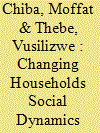

|
|
|
|
|
| Summary/Abstract |
This article explores household-level social dynamics of change and their causal effects on future agricultural practices and food security. It does this by employing a place-specific qualitative research methodology in two rural settlements in Shamva District, Mashonaland Central Province. It reveals how these changes have impacted negatively on farm households’ command of assets, including draft power, labour and social networks. Households that had a long history of agricultural excellence started to experience declines in their agriculture, while new households encountered new vulnerabilities. The article concludes by cautioning against any policy that ignores the household as a production unit in Zimbabwe’s agriculture.
|
|
|
|
|
|
|
|
|
|
|
|
|
|
|
|
| 2 |
ID:
193201
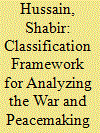

|
|
|
|
|
| Summary/Abstract |
In this study, we present a contextual model for analyzing the escalatory and de-escalatory trends in media reporting of seven conflicts in Pakistan. For this purpose, we combined findings from both survey and content analysis. While the survey helped to examine the journalists’ perceptions about the security threats of conflicts and the factors that influence the reportage, the content analysis was utilized to analyze the escalatory and de-escalatory characteristics in the coverage. The findings show that high security conflicts lead to a patriotic reporting scenario that results in high escalatory coverage. There is a significant decrease in the escalatory coverage as the assumed threat level of a conflict decreases. Similarly, we found that a conflict in which journalists exercised more relative freedom from pressure groups was reported in de-escalatory fashion. These findings can be useful for strategizing for the implementation of peace journalism in Pakistan in particular and elsewhere in general.
|
|
|
|
|
|
|
|
|
|
|
|
|
|
|
|
| 3 |
ID:
193198
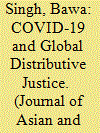

|
|
|
|
|
| Summary/Abstract |
The second wave of the COVID-19 pandemic had left heart-wrenching impacts on all facets of life in general and the availability, accessibility, and affordability of medicines and vaccines in particular. Rather, the world has been divided into two groups regarding access to medicine and vaccines as haves and have-nots. The rich countries had pre-ordered the vaccines of COVID-19 along with the holding of the same. The pandemic situation was further worsened, given the Trade-Related Intellectual Property Rights (TRIPS) in practice and restrictions on sharing technology of vaccines, medicines, and life-saving equipment. In this context, India and South Africa have proposed the joint proposal and garnered support for waiving off TRIPS to ensure equity, accessibility, and affordability of vaccines and the same as public goods. In this review, we emphasize that global justice is one of the important elements of normative international theories, which focus on all the moral obligations from the world’s rich to the world’s poor. The paper also questions and argues that if the rich countries fail to go by the principles of global justice, can the Indian and South African (SA) patent diplomacy play a catalyst role in global justice? The review concludes with an emphasis on global solidarity, and the acceptance of joint India–South Africa’s “patent diplomacy” for TRIPS waiver would result in mass production and fair distribution, making the COVID-19 medicines and technologies available to everyone regardless of their poor–rich status.
|
|
|
|
|
|
|
|
|
|
|
|
|
|
|
|
| 4 |
ID:
193191
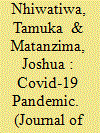

|
|
|
|
|
| Summary/Abstract |
Man-made reservoirs are constructed to meet certain purposes and Lake Kariba, Zimbabwe, was designed for hydroelectric power generation. However, it has developed other multiple uses, and the growth of fisheries on the lake has had a significant impact on the livelihoods of local communities. The declaration of Covid-19 as a pandemic in Zimbabwe in March 2020 was quickly followed by the imposition of national lockdowns with varying levels of severity up to the present day. This was done to curtail the spread of the disease, meanwhile enhancing the nation’s capacity in terms of acquiring testing kits, constructing more admission and quarantine centres as well as educating the people about ways to keep safe. In response to the calls by the government to monitor the movement of people and compliance of the lockdown rules, the Zimbabwe National Parks and Wildlife Management Authority (ZNPWMA), the governing body of the Lake Kariba fisheries, imposed rules that have significantly impacted the fishing communities at Lake Kariba. Both gillnet fishers and rod and line fishers have been impacted, but our focus here is on women rod and line fishers. Using the precarious livelihoods conceptual frameworks, we show how the changes in water management during the Covid-19 pandemic lockdowns has generated high levels of precariousness on the livelihoods of women at Kariba. We define precariousness as the condition of uncertainties brought to the women fishers by changes in water restrictions. The precarity of women was induced by several factors. For instance, the women fishers reported that restrictions to accessing fish in areas with high catches impacted them. They are also now obliged to pay exorbitant fishing fees in a way to discourage them to fish; they were frequently chased away from the Lake by ZNPWMA officers; they had limited amount of time to fish due to curfews; and failure to comply results in heavy fines imposed on them among other challenges. We show how these challenges interact with the current Zimbabwe socio-economic crisis to worsen the precariousness and vulnerability of women fishers at Lake Kariba. Data presented in this manuscript are based on participant observation and interviews with women fishers at Lake Kariba.
|
|
|
|
|
|
|
|
|
|
|
|
|
|
|
|
| 5 |
ID:
193200


|
|
|
|
|
| Summary/Abstract |
This article probes the rural economic development approach in selected informal settlements in Durban and how such approach affects the vulnerability of local Black women to flood impacts within the areas. Qualitative data for the study were gathered through semi-structured interviews and focus group discussions with 25 local Black women from Inanda, Ntuzuma, KwaMashu and Umlazi. Five key informants from the eThekwini (Durban) metropolitan municipality were also interviewed. Findings from the study showed that although there is improved economic development in the selected settlements, which constitute informal settlements designated for Black South Africans during the apartheid era, such an economic development approach has not significantly improved the livelihoods and adaptive capacity of the local women. The article suggests a multidimensional approach to development that is practical, inclusive and equitable, and addresses local women’s challenges associated with climate adaptation and sustainable livelihoods.
|
|
|
|
|
|
|
|
|
|
|
|
|
|
|
|
| 6 |
ID:
193202


|
|
|
|
|
| Summary/Abstract |
The paper interrogates the paradox of persistent youth unemployment amid an upswing of impressive economic growth after Neo-liberal reforms in Uganda. The government of Uganda undertook targeted interventions to ameliorate youth unemployment, which escalated. Why was the growing economy failing to absorb labour? Why were the interventions failing? We argue that the interplay of the skewed neo-liberal and global architecture, decline of traditional labour absorbing sectors, and the debilitating syncretic ‘informal’ sector constrained sustainable youth employment and deflated interventions. The paper opines that Uganda’s neo-liberal capitalism was unique, as it was structured in a way that did not enhance domestic actors and sectors, which would have increased sustainable labour absorption and utilisation. Otherwise, Uganda’s celebratory growth was largely aid-driven and in the controversial and constrained informal sector, limited service ‘enterprises’ and import consumerism, which undermined domestic productivity and employability. Neo-liberalism and the reconstituted state did not align the domestic and global economic structures for meaningful employment. Unemployment spiralled into the socio-political landscape, while youth agency strived for better positioning.
|
|
|
|
|
|
|
|
|
|
|
|
|
|
|
|
| 7 |
ID:
193195
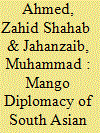

|
|
|
|
|
| Summary/Abstract |
This article examines the mango diplomacy of South Asia’s mango exporting countries. Diplomatic gifts are a common feature of public diplomacy of diplomatic missions globally. There are many prominent examples of that including China’s panda diplomacy and mango diplomacy of South Asia’s mango exporting countries like Bangladesh, India and Pakistan. Based on the analysis, this study argues that Pakistan is a dominant actor in terms of mango diplomacy and has an extensive strategy, for example, including mango exhibitions, to increase its mango exports and goodwill in target countries.
|
|
|
|
|
|
|
|
|
|
|
|
|
|
|
|
| 8 |
ID:
193194
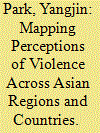

|
|
|
|
|
| Summary/Abstract |
Violence is increasing in Asia. However, limited research exists on the prevalence and types of violence across Asian regions and countries; a comprehensive study on a continental-scale in Asia has been understudied. Guided by the World Health Organization’s definition of violence, this study used World Values Survey Wave 7 (n = 35,435) to map the perceptions of the justifiability of three categories of violence (self-inflicted, interpersonal, collective) with five subtypes (suicide, intimate partner violence against wife, child abuse, violence toward other people, political violence) in six regions and 24 countries in Asia. Findings indicate that perceptions of the justifiability of violence are significantly different across regions in Asia. Perceptions of the justifiability of various types of violence differed across Asian countries. Considering the complexity and diversity of violence across Asian regions and countries, this study may be a cornerstone for violence research in Asia.
|
|
|
|
|
|
|
|
|
|
|
|
|
|
|
|
| 9 |
ID:
193193


|
|
|
|
|
| Summary/Abstract |
This study developed a model that predicted factors that prompt the intention to take the COVID-19 vaccine among Nigerians. Data were collected from 385 respondents across Nigeria using snowball sampling technique with online questionnaire as instrument. Results indicated that cues to action, health motivation, subjective norms, and perceived behavioural control positively predicted the intention to take COVID-19 vaccine in Nigeria. However, perceived susceptibility, severity, and COVID-19 vaccine benefits did not predict the intention to take the COVID-19 vaccine. Further findings showed that COVID-19 vaccine barrier and attitude was negatively associated with the intention to take the COVID-19 vaccine.
|
|
|
|
|
|
|
|
|
|
|
|
|
|
|
|
| 10 |
ID:
193199


|
|
|
|
|
| Summary/Abstract |
This paper examines the phenomenon of crime–terror nexus from the standpoint of the linkage between banditry and Boko Haram insurgency in Northern Nigeria. Using a descriptive analysis predicated on a combination of primary and secondary studies, the paper reveals that both groups have functionally adapted each other’s structures and strategies. While Boko Haram and its splinter groups have occasionally engaged in acts of banditry, there has been mutual co-option by both groups as the exigencies of their operations demand. Nigeria’s drive at mitigating the banditry-terrorism conundrum must proceed with a pragmatic understanding of the gamut and dynamics of their situational nexuses.
|
|
|
|
|
|
|
|
|
|
|
|
|
|
|
|
| 11 |
ID:
193197
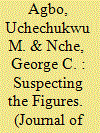

|
|
|
|
|
| Summary/Abstract |
Public trust in government can significantly determine the outcome of health policies in any society. Hence, studies have been gauging peoples’ level of trust in their governments’ commitment and capacity to win the fight against COVID-19. However, these studies have omitted religious leaders. This is despite the fact that religious leaders play key roles in the area of health in many societies. The present study, therefore, explored the opinions church leaders have about the credibility of the COVID-19 statistics and other government responses in Nigeria. Data were collected through semi-structured interviews with 18 church leaders drawn from Anglican, Catholic, and Pentecostal churches in Nigeria. A descriptive narrative approach was employed in the thematic organization and analysis of data. Findings show that only one participant expressed confidence in the credibility of the COVID-19 statistics and other government’s responses. The rest, with the exception of one participant who was uncertain, was distributed between those who believe the statistics and other government efforts are exaggerated and those who believe they are false. The study also found that denominational affiliation mattered with respect to the perceptions about the credibility of the COVID-19 statistics and other government responses. Implications of findings for policy and research are discussed.
|
|
|
|
|
|
|
|
|
|
|
|
|
|
|
|
| 12 |
ID:
193196


|
|
|
|
|
| Summary/Abstract |
Frontier making in Ethiopia has historical roots from the formation of the modern Ethiopian state in the late-19th century through wars of conquest. The conquest, which was inspired by political and economic motivations of the highland Christian kingdom, used the notion of a “civilizing mission”—civilizing the “backward” and “underdeveloped” people, and “underutilized” spaces—through imposition of an imperial state system and Orthodox Christianity. The foundation and horizontal expansion of Addis Ababa or Finfinne by displacing Indigenous inhabitants was part of the state building project under successive regimes. Over the last century and a half, the city has continued its unchecked expansion in a process involving multilayered actors whose interests overlapped in terms of grabbing the land they considered “underutilized.” More specifically, the last three decades evince commoditization of farmlands, grazing areas, and cultural and sacred spaces through land lease, which eventually dissolve existing customary systems, values, and practices. This paper critically analyzes the dynamics of frontier making in or from Addis Ababa or Finfinne, the political economy behind such unchecked frontier expansion and how it activated the power of resistance in 2014. The paper concludes that frontier making in or from Addis Ababa through dispossession of Oromo farmers has been part of the broader political establishment in Ethiopia and should be viewed within the same lens.
|
|
|
|
|
|
|
|
|
|
|
|
|
|
|
|
|
|
|
|
|